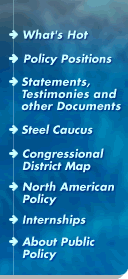 |
DOMESTIC POLICIES THAT
IMPACT AMERICAN STEEL'S INTERNATIONAL TRADE
COMPETITIVENESS
America's own domestic economic policies can
enhance -- or impair -- U.S. competitiveness and
trade prospects. Following are some examples:
- AMT.
The corporate Alternative Minimum Tax (AMT)
maintains slower depreciation methods than under
the regular corporate tax. The AMT raises the
cost of capital for steel and other AMT payers
by about 3.6%, acts as a disincentive to capital
investment in steel and other U.S. industries,
and harms the competitiveness of steel and other
AMT payers.
- Border-adjustable
tax. The U.S. remains virtually the only
major economy in the world that does not employ
some form of World Trade Organization-legal
border-adjustable tax, which exempts exports and
applies to imports the same as
domestically-produced goods.
- Health
care. U.S. steel companies spent over
$1.5 billion for health care in 1998 - for
workers, retirees and dependents. Some proposed
"reforms" would cause additional increases in
this cost, which is still rising at two to three
times CPI. This would adversely affect U.S.
steel producers vis-a-vis foreign competitors,
many of whose costs are borne by government
through general tax revenues.
- OSHA.
The complexity and cost of compliance with
Occupational Safety and Health Administration
(OSHA) regulations continue to increase. Many
OSHA rules do not have a sound
scientific/medical basis, are impractical and
cost-ineffective.
- Electricity
policy. Electricity is a major component
of steel manufacturing costs, but it cannot be
purchased on a competitive basis as are other
commodities.
- Global
climate change. Efforts by the U.S. to
achieve a 7% reduction in greenhouse gas
emissions from 1990 levels by the year 2012, as
dictated by the Kyoto Protocol, could result in
$5 billion in additional annual energy costs for
U.S. steel companies. Limiting such measures to
developed countries fails to address the most
significant likely increases in greenhouse gas
emissions (developing countries), yet it places
developed countries at a significant economic
disadvantage
- CAFE
standards. The policy of mandating
Corporate Average Fuel Economy (CAFE) standards
is counterproductive in terms of energy savings,
causing harm to U.S. consumers, the U.S.
economy, and the U.S. auto and steel industries
in particular. Increases in CAFE would compound
the damage.
- Clean
Air. Proposed tighter standards for
particulate matter could place much of the
United States - including many steel industry
sites - in non-attainment areas. The result
would be enormous new costs for steel and other
industries, with no comparable requirements for
U.S. trading partners. Sound science, common
sense, measured implementation, and a new regime
of risk assessment and cost-benefit analysis are
needed.
- Superfund,
RCRA
and brownfields. Cleanup standards and
remedy selection in Superfund and Resource
Conservation and Recovery Act (RCRA) corrective
action programs are cost-ineffective. No
comparable programs exist in other nations.
Likewise, U.S. steel companies are often stymied
in their efforts to return former industrial
properties - so-called brownfields - to
productive, job-creating use. There needs to be
liability reform.
 To
Top To
Top
|





